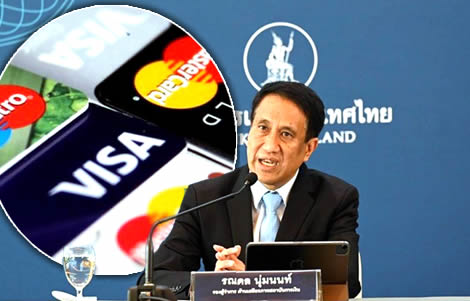Hundreds of thousands of middle-class Thais are trapped in debt cycles that act as a continuous tax on their income at a high level, often leaving them with marginal funds to exist on. The problem has been hampering economic growth for the last decade and now presents as a gun to the head of the financial system if not tackled with ฿7.8 trillion owed in unsecured loans.
Thailand’s Bank of Thailand, on Friday, unveiled an initiative to break the back of the country’s chronic household debt problem running at 90.6% of GDP. The problem of household debt within the established banking system is very much a middle-class one and may help explain the country’s lack of growth in the last decade compared to other Southeast Asian economies and the radical shift among the country’s urban elite to the Move Forward Party in the May 14th General Election. The plan unveiled by the central bank this week, which comes into play in 2024, will hold Thailand’s banks and financial institutions to higher standards of care and discipline.

On Friday, the Bank of Thailand gave a briefing on its plan to tackle the country’s surging household debt problem which has been identified by the National Economic and Social Development NESDC as a potential threat to the economy.
In May this year, the Secretary General of the agency, Mr Danucha Pichayanan, warned that unless the matter was brought in hand, it could trigger a financial crisis in Thailand.
New figures, recently released following a reassessment of household debt which has now been brought fully under the auspices of the Bank of Thailand, revealed that the kingdom’s private sector borrowers have ฿16 trillion in private debt outstanding to banks and other financial institutions representing 90.6% of GDP.
Briefing given to media on Friday last by Bank of Thailand Deputy Governor Ronadol Numnonda as concern is rising about defaults on auto loans
The briefing on Friday was given by Bank of Thailand Deputy Governor Ronadol Numnonda who is responsible for oversight of financial institutions and stability within the banking sector at the central bank.
In the last few weeks, concern has been expressed at the rising level of defaults within the motor loan sector of the banking industry in the kingdom.
Potential hazard lights flashing as kingdom’s auto loans spiral into default with sky-high borrowing
Reports from financial institutions suggest the default rate on automobile loans in Thailand is currently running at 14.2% with fears that up to a million vehicles may be repossessed if the chronic situation is not resolved swiftly.
These figures are coming from Thailand’s National Credit Bureau which keeps track of borrowers in the kingdom.
The extent of car loans on the books of Thai banks and other institutions represents 17.21% of outstanding loans or ฿2.6 trillion.
Focus of this plan is on unsecured personal debt to middle-class borrowers such as credit card debt and continuously revolving personal loans
On Friday, however, the key concern for Deputy Governor Ronadol was the ฿7.8 trillion in unsecured loans on the books of banks and other institutions in Thailand, much of which turns out to be revolving loans with millions of borrowers, many of them middle-class people with secure jobs, but who are unable to repay the principal sums off and instead are trapped in a debt cycle.
In this way, banks are earning money from this market almost as a continuous tax on income with borrowers unable to break free of the debt trap.
The fear is that with these loans unsecured, a trend may develop where borrowers decide to default in the face of crippling monthly repayments as covid era concessions which were halted at the end of 2022, leave them shouldering a heavier monthly repayment burden while interest rates and the cost of living are rising.
A key weakness in Thailand’s financial system is that only 35.1% of borrowings within the financial system are secured by property which is very low when compared, for instance, to Western banking systems
The personal loans within the system are effectively unsecured either by property or cars.
Many of those trapped in this debt pay interest rates of up to 25% per annum with much of it classified as credit card debt or other personal loan products.
2024 is the year the bank insists on robust new measures to give borrowers a way out while also imposing higher duties of care on the country’s banks
Mr Ronadol, on Friday, suggested that the bank was ready from April 1st, 2024, to introduce more robust measures in dealing with the provision of loan services within the Kingdom which would extend to all financial institutions, requiring a higher quality of service to potential and existing customers.
The goal of this initiative is to reduce the number of people involved in revolving loans over a five to ten-year period.
The deputy governor, on Friday, referred to this problem as persistent debt and suggested that the bank was setting out to reduce the ceiling on interest rate charges on such debt to 15% per annum while encouraging borrowers to exit their loans in a faster time frame under a new scheme.
Mr Ronadol gave an example of a borrower with a ฿15,000 credit line paying 25% interest and 3% of the capital.
The borrower ends up paying off the loan over 18 years at fixed payments each month while racking up new debt. Over the period, the borrower pays ฿29,000 in repayments.
Under the central bank’s proposed new scheme of persistent debt account holders, a higher monthly payment per month will see the account closed off within three and half years with repayments of ฿17,500.
‘We want to help persistent debt borrowers as the initial group under the Household Debt Resolution Plan because they suffer from the debt burden and are stuck in a debt cycle for a long time. This is especially true for severe, persistent debt borrowers,’ the deputy governor told the media.
Banks to experiment with risk-based pricing with no interest rate ceiling while adhering closely to central bank guidance and more online intelligence
As part of the new regime entering into the second quarter of 2024, the central bank is looking at allowing risk-based pricing to allow financial institutions to vary the interest rate on offer to borrowers depending on their credit history and profile.
At the same time, new and improved reporting systems which the bank is hoping to bring about, will come into play to monitor borrowing activity.
The bank will not enforce a maximum debt ceiling under the new pricing initiative.
In return, the central bank will encourage financial institutions and retail banks to become involved in the development of a more advanced credit scoring system which will be under the auspices of the Bank of Thailand.
The central bank plans to extend facilities developed in 2020 after the COVID-19 crisis to deal with households suffering from chronic levels of debt.
Economy improving only marginally but the loan repayment burden jumped in 2023 as Covid era concessions ended, banks urged to slow down loans
On one hand, with an improving economy, households are currently generating more income but on the other hand, the suspension of concessionary payment facilities at the end of 2022 is a possible reason for the current crisis within the system as households find themselves bearing a steeper burden in repayment costs.
This is thought to be a key factor behind the sudden surge in non-performing loans within the auto sector.
It is understood that from January 1st 2024, banks and financial institutions will be encouraged to comply with new responsible lending measures which will dissuade lenders from overselling financial products while providing essential guidance to borrowers on how they can exit loan facilities at an earlier stage if it is possible or increase repayments in situations where funding becomes available to them.
Loan tests will be part of a new quality control approach.
Central bank wants to see more use made of DSR or Debt Service Ratio in loan decision-making and on arrangements made with over-extended borrowers
Another key feature of the new financial regime that is to be ushered in by the central bank is the use of a debt service ratio known as DSR metrics concerning borrowers.
This shows the financial repayment element or ability of a borrower’s monthly or annual income compared to their debt burden.
The bank recently released a report in February this year in which it made an assessment of the country’s household debt level in more detail than before, showing that many borrowers are shouldering an excessive burden of debt by focusing on this ratio.
For business borrowers, for instance, in 2021, the DSR rate on monthly income was 44.1%.
The overall assessment for Thai borrowers came in at 42.8% according to data from the central bank and a poll conducted by K Research, the research arm of Thailand’s Kasikorn Bank.
The Bank of Thailand is proposing that specific measures to control the DSR for borrowers will be introduced next year as part of its new programme in particular as part of the first phase of the bank’s plan to tackle the country’s chronic household debt problem.
Banks are urged to help borrowers escape debt traps while allowing for manageable debt service ratios
This will see the rating of thousands of accounts which are involved in revolving debt, linked to personal loans and credit cards, under the central bank’s proposed new scheme.
The plan put forward by the bank this week also deals with guidance on the advertising of loans and the bank’s relationship with its borrowers while the repayment cycle is underway.
The central bank wants to see new standards on how banks deal with problems when they arise so that borrowers are informed of their legal rights while also providing for potential bad debt solutions where the interest rate is capped at 15% per annum while borrowers are allowed to retain enough money from their income to cover their day-to-day living expenses.
‘The Bank of Thailand’s measures to solve household debt problems this time marks a turning point in adjusting the behaviour of both creditors and debtors. We are here to help solve existing debt problems but also to take care of new debts and in this way reduce household debt to a sustainable level. This will take time and relies on the cooperation from all involved,’ Mr Ronadol concluded.
Thailand’s economy is still undeveloped and the country’s chronic household debt problem may have bitten the conservative establishment in the election
It should be noted that up to 20% of the Thai adult population does not have access to formal banking facilities while the proportion with access to credit is probably far higher than this.
To put this in perspective, a figure quoted by consultants Mc Kinsey in 2022 showed that only 30% of Thai SMEs had access to formal lending facilities indicating that the situation among the general population may be even lower.
This leaves most Thai people seeking funding from informal sources such as monthly lenders offering extortionate loans where the interest charge can run as high as 10% per month on the principal while businesses often borrow on property on an annual basis against their properties in short term mortgages at rates of up to 25%.
Election vote for Move Forward may have been a cry for help from voters mired in short-term debt
The problem, therefore, being addressed by the Bank of Thailand is within the country’s formal economy and involves many borrowers working for the state, large institutions or national or multi-national firms on a professional basis, together with bigger firms in the formal Thai economy which still only accounts for 50% of real economic activity or GDP apart from the country’s extensive black economy.
Political analysts have argued that the chronic level of indebtedness among the growing urban middle class in Thailand and higher loan repayments in 2023 could well be a key factor which prompted normally establishment-minded voters to turn in this year’s election to the Move Forward Party which promised a more westernised state system based on European models with higher salaries, state supports in return for a wider scale but more progressive tax system.
Such an economic model, introduces incrementally, may favour the growing numbers of educated middle-class voters in Thailand struggling with a crippling debt burden.
Join the Thai News forum, follow Thai Examiner on Facebook here
Receive all our stories as they come out on Telegram here
Follow Thai Examiner here
Further reading:
Politicians skating on thin ice as the economy may not be able to withstand a political stalemate
Debt crisis may be one of the top items on the new cabinet’s agenda as central bank stands ready
Potential hazard lights flashing as kingdom’s auto loans spiral into default with sky-high borrowing
Bank of Thailand governor gives veiled warning to voters on the danger posed by populist policies
Financial markets debt sell-off sending a signal to Thailand before the May 14th General Election
PM warns giveaway policies of some parties may be ‘bad karma’ for the country in the longer run
Economic recovery shaky despite strong foreign tourism as global economic outlook deteriorates
Recession fears rise as growth projections are cut and export output continues to decline in 2023
Economy faces export clogs with rules in China and ‘green imperialism’ from European Union
Vital European Union free trade deal with Thailand with stiff demands from Brussels to take time
Thailand’s financials are sound but the economy is exposed if another world banking crisis emerges
Thai economic woes grow with a 10-year high trade deficit as January exports slumped by 4.5%
Credit crunch as firms seek more bank loans with tightened lending criteria and recession fears
Even as the baht surges, Thailand faces economic recession in mid-2023 with lower earnings


















